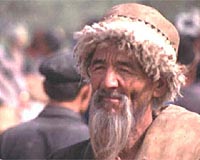| . |  |
. |
Spin Boldak, Afghanistan (AFP) Oct 8, 2009 In the dust bowl of southern Afghanistan, near the mountainous border with Pakistan, US soldiers from Spin Boldak forward operating base were preparing for a very important meeting. Four rows of chairs arranged on a carpet in a concrete building had been put out, awaiting the arrival of the 30 or so leaders of rival local tribes invited to discuss their needs. The black, red and green tricolour flag of Afghanistan and a portrait of President Hamid Karzai had been fixed to the wall, and tea and cashew nuts laid on. "It's probably one of the biggest things that we have done since we arrived," Lieutenant Colonel William Clark told his men, as the final touches were put to the tribal meeting, which has taken one month to organise. "If we offend people today, we are going to lose. These shura council members and district leaders, they don't communicate well. What we're trying today is get them to communicate. "I ask you to treat them with the respect you're giving to guests in your home. It's important not only for us but for what's going on here in Afghanistan." Some 700 US soldiers and about 60 armoured vehicles have been in this remote region since August, part of an extra 4,000 troops sent by Washington to the restive southern province of Kandahar, spiritual home of the Taliban. Before their arrival, only about 30 Canadians were based at Spin Boldak, where at night the lights of the Pakistani town of Chaman blink in the distance. Unlike other areas, where their comrades have come up against tough Taliban resistance, the men of the 8th Squadron 1st Cavalry Regiment of the 5th Brigade, 2nd US Army division have had a calmer time of it. "I feel like we are social workers with guns because, for the most part, the enemy threat is not very strong here so our main focus is go meet the population and build infrastructure," said Second Lieutenant Mike Stahlke. Stahlke's assessment is straight out of the counter-insurgency manual: win the support of the local population to prevent them helping insurgents, who head to Kandahar via Spin Boldak with drugs, weapons and home-made bombs. Civil affairs officer Major Howard Marbut summed up the problem facing not just US troops here, but foreign forces across Afghanistan, where the Taliban is spreading its footprint. "The Taliban are providing services that the government does not," he said. At two o'clock, the turbaned tribal leaders begin to troop in and a mullah chants a prayer in a modulating voice. Talks can now begin. The conversation quickly becomes heated and voices are raised. "It's like Iraq. They just can't agree on something and make a decision," said one US soldier. Two hours later, Clark calls for a break around a lavish spread of rice, fruit and lamb -- slaughtered especially earlier in the day -- but the negotiations resume. At sunset, a consensus emerges despite resistance from those who will come away from the talks empty-handed. The two tribes agree on the need to build two reservoirs and draw up a priority list of 18 villages -- nine for each side. The elders are all smiles again, embrace the Americans and leave. Clark intends to send his teams to check regularly on the construction work to prevent any temptation to syphon off funds -- a common Afghan tactic that is feeding widespread discontent among the populace. "I need to make sure that what we're doing affects the people and that they see what their leaders do for them, so that they don't work with the insurgents," Clark said.
Share This Article With Planet Earth
Related Links News From Across The Stans
 Qaeda urges Uighurs to launch jihad against China: SITE
Qaeda urges Uighurs to launch jihad against China: SITEDubai (AFP) Oct 8, 2009 Al-Qaeda leader Abu Yahia al-Libi has called on Uighurs to launch a jihad against the Chinese authorities and has urged Muslims worldwide to support their co-religionists, a US monitoring group reported. "It is the duty of Muslims today to stand by the side of their wounded and wronged brothers in East Turkestan," Libi said in a video recording posted on an Islamist website, according to ... read more |
|
| The content herein, unless otherwise known to be public domain, are Copyright 1995-2009 - SpaceDaily. AFP and UPI Wire Stories are copyright Agence France-Presse and United Press International. ESA Portal Reports are copyright European Space Agency. All NASA sourced material is public domain. Additional copyrights may apply in whole or part to other bona fide parties. Advertising does not imply endorsement,agreement or approval of any opinions, statements or information provided by SpaceDaily on any Web page published or hosted by SpaceDaily. Privacy Statement |